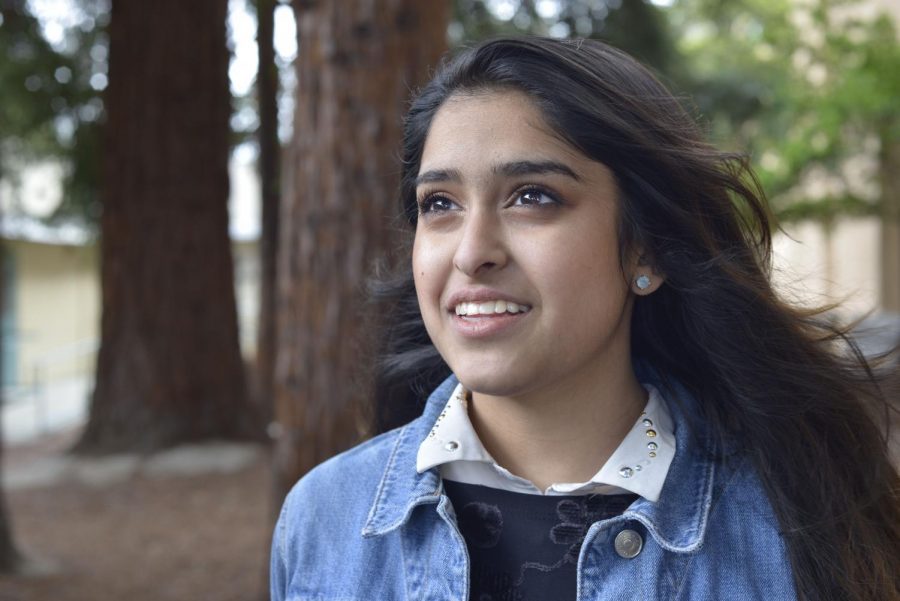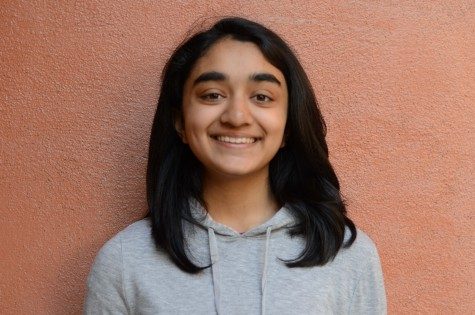Humans of Harker: Maya Kumar prioritizes helping the environment––and anyone else she can
“Instead of buying clothes at a store, I want to transition to all my clothes being bought secondhand, which I’m slowly working on, and I would just want to adopt daily practices, because sometimes I still use those disposable cups because I leave my water bottle at random places,” Maya Kumar (12) said. “I’m definitely that person at the grocery store who might have a bunch of things in my hand but will refuse to get a bag, and it’s slightly embarrassing because I’m about to drop everything, but I’m trying to stay true to my values to the extent that it’s reasonable at this point in my life.”
June 5, 2018
Senior Maya Kumar’s interest in helping the environment––and studying environmental engineering––began, in some ways, with John Oliver.
“One episode [of Last Week Tonight] that really struck me was about fast fashion and about how that industry is a) polluting and b) uses a lot of unethical labor sources,” Maya said. “Instead of buying clothes at a store, I want to transition to all my clothes being bought secondhand, which I’m slowly working on.”
Maya is taking her environmentalism beyond reacting to the focus of the episode; re-attempting veganism, switching to only reusable bottles and promoting basic daily practices are on her list.
“While I’m not naive enough to think I can ever be a person who can be perfectly ethical and live out all of my values, I want to––at least to the fullest extent that I can––be able to be proud of my actions as a human and be able to support the things I care about and avoid the things that can be harmful,” Maya said.
Maya quantifies support for her causes by labelling wasting resources as a “negative” and contributing positively back to her surroundings as a “positive.” She aims, over the course of her life, for a net positive.
“That comes in two steps, the first one being on a personal level trying to reduce water usage, not using plastic bags at grocery stores, using reusable cups where I can, not using straws and things like that,” Maya said. “On a second level, what’s more important is I want my career to be something that somehow positively contributes to sustainability. I don’t know if that’s going to be in the field of water reuse or renewable energy or environmentally friendly technologies but something that’s always been on my consciousness is that I want to dedicate my life to being not a waste.”
That dedication manifests itself in everything she does, something her friends get to witness often.
“She’s always striving to be a better version of herself,” said Aliesa Bahri (12), who has been friends with Maya since elementary school. “I always see her trying new recipes, learning to sew––she was the first one of us to get her learner’s permit, she’s always out there discovering new activities and new skills to teach herself and I think that’s because she wants to take advantage of everything that her surroundings have to offer while simultaneously not being a drain on the society that raised her.”
Even as she jokes about being a waste in society, Maya keeps up a smile, pausing to laugh several times. Being upbeat and being caring are some of the core characteristics that not only Maya’s friends value, but that Maya herself prioritizes.
“Maya is quite the character. On one hand, she’s a really amusing person to be around,” Maya’s friend Aria Coalson (12) said. “She has so many interesting hobbies, and I just like talking to her since she knows about something things and she just likes to explore her passions and expand her knowledge for more than the sake of school. Maya is also a really caring person; she’s probably one of the most thoughtful people I know. If she sees someone who’s feeling down, she can pick up on that.”
To Maya, part of caring is understanding other people, a feat made easier because of the level at which she understands herself.
“I’m secure enough in my own flaws that I can accept other people’s,” she said. “I suppose that’s how I stay a very calm person, and I just try to be understanding of everyone around me, because I’m very flawed and I accept my own flaws, so by the transitive property I should accept other people’s.”
In her freshman year, Maya tried to avoid other people helping her in the way she does for others, citing a desire not to inconvenience anyone.
“As I got into higher grades, I realized that was kind of ridiculous and being able to lean on other people is super important, and being a loner can’t get you that far. I’m going to lean on other people, and also let other people lean on me.”


















![“[Building nerf blasters] became this outlet of creativity for me that hasn't been matched by anything else. The process [of] making a build complete to your desire is such a painstakingly difficult process, but I've had to learn from [the skills needed from] soldering to proper painting. There's so many different options for everything, if you think about it, it exists. The best part is [that] if it doesn't exist, you can build it yourself," Ishaan Parate said.](https://harkeraquila.com/wp-content/uploads/2022/08/DSC_8149-900x604.jpg)




![“When I came into high school, I was ready to be a follower. But DECA was a game changer for me. It helped me overcome my fear of public speaking, and it's played such a major role in who I've become today. To be able to successfully lead a chapter of 150 students, an officer team and be one of the upperclassmen I once really admired is something I'm [really] proud of,” Anvitha Tummala ('21) said.](https://harkeraquila.com/wp-content/uploads/2021/07/Screen-Shot-2021-07-25-at-9.50.05-AM-900x594.png)







![“I think getting up in the morning and having a sense of purpose [is exciting]. I think without a certain amount of drive, life is kind of obsolete and mundane, and I think having that every single day is what makes each day unique and kind of makes life exciting,” Neymika Jain (12) said.](https://harkeraquila.com/wp-content/uploads/2017/06/Screen-Shot-2017-06-03-at-4.54.16-PM.png)








![“My slogan is ‘slow feet, don’t eat, and I’m hungry.’ You need to run fast to get where you are–you aren't going to get those championships if you aren't fast,” Angel Cervantes (12) said. “I want to do well in school on my tests and in track and win championships for my team. I live by that, [and] I can do that anywhere: in the classroom or on the field.”](https://harkeraquila.com/wp-content/uploads/2018/06/DSC5146-900x601.jpg)
![“[Volleyball has] taught me how to fall correctly, and another thing it taught is that you don’t have to be the best at something to be good at it. If you just hit the ball in a smart way, then it still scores points and you’re good at it. You could be a background player and still make a much bigger impact on the team than you would think,” Anya Gert (’20) said.](https://harkeraquila.com/wp-content/uploads/2020/06/AnnaGert_JinTuan_HoHPhotoEdited-600x900.jpeg)

![“I'm not nearly there yet, but [my confidence has] definitely been getting better since I was pretty shy and timid coming into Harker my freshman year. I know that there's a lot of people that are really confident in what they do, and I really admire them. Everyone's so driven and that has really pushed me to kind of try to find my own place in high school and be more confident,” Alyssa Huang (’20) said.](https://harkeraquila.com/wp-content/uploads/2020/06/AlyssaHuang_EmilyChen_HoHPhoto-900x749.jpeg)







